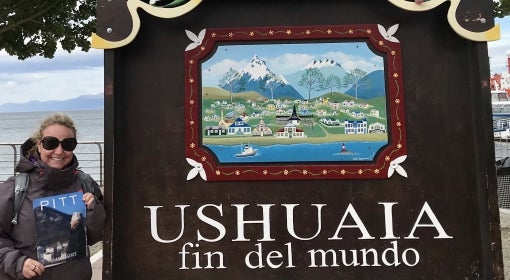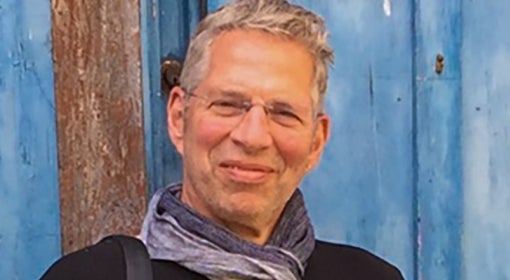The aromas drifting from the William Pitt Union Assembly Room are sublime. The bold fragrances of garlic and onion meld with the subtle scents of turmeric, paprika, and peppers. The effect is mouthwatering and catches the attention of several passing students, who peer curiously through the room’s open doors.
Inside, the space is packed with people. Many wait in lines that snake from tables bearing posters and different national flags. Atop each table are varied dishes that all have one delicious thing in common: potatoes.
This is You Say Potato, a whole new approach to a language fair. Faculty representatives of most of the languages taught at Pitt are inspiring interest in their programs by serving up a potato dish related to their discipline. Cohosted by the Less-Commonly-Taught Languages Center, the Department of Linguistics, and the Study Abroad Office, it’s a fun way to introduce students to the University’s diverse range of language course offerings.
Colored slips attached to the tables indicate the word for “potato” in each language. In Hungarian, it’s krumpli. It’s khoai tây in Vietnamese; práta in Irish; papa in Quechua; and aloo in Hindi. As students approach each dish, instructors answer questions about classes and encourage them to sound out the foreign words.
The dishes are as varied as the languages represented. At the Hungarian table, there’s a steaming urn of paprikás krumpli—potatoes stewed with onions, sausage, and paprika. Crunchy potato latkes shine with oil at the Hebrew table, and over with the Mandarin instructors is a heap of thinly sliced and stir-fried potatoes in a dish called la chao tu dou si. As for the American Sign Language Program? Several flavors of potato chips, one of the country’s favorite snacks.
Karen Park, assistant professor in the Department of Linguistics, pauses from helping interested students to savor the moment. “This event brings me great joy and great envy because I want to study every one of these languages,” she says with a laugh.
Each language is an opportunity to learn about the world, Park continues. “When you explore a language you oftentimes get insights into culture and history.”
So, why specifically target tubers? According to Park, linguists can use the humble potato to talk about language, agriculture, migration, power, and other complicated issues.
The world’s fourth-largest food crop is indigenous to the Andes region of South America and is a relatively new entrant into globalized cuisine. But, in the 16th century, after it arrived in Europe in the ship hulls of Spanish conquistadors, the hearty vegetable would quickly travel the world, eventually rooting itself in the diets of people from Ireland to Indonesia.
Back in the Assembly Room, the platters of starchy snacks are rapidly emptying.
“Everything’s so good, but I don’t think I can eat anymore,” one young woman laments, an empty plate in her hand and a mind full of new information.
Yet, as the swelling crowd demonstrates, an insatiable hunger for knowledge can transcend even the limits of the stomach.
This article appeared in the Summer 2018 issue of Pitt Magazine.




